Holberg Prize
The Holberg Prize is an international prize awarded annually by the government of Norway to outstanding scholars for work in the arts, humanities, social sciences, law and theology, either within one of these fields or through interdisciplinary work. The prize is named after the Danish-Norwegian writer and academic Ludvig Holberg (1684–1754). The Holberg Prize comes with a monetary award of 6 million Norwegian kroner (NOK) (approximately $750 000 or €660 000), which are intended to be used to further the research of the recipient. The winner of the Holberg Prize is announced in March, and the award ceremony takes place every June in Bergen, Norway.
| The Holberg Prize | |
|---|---|
.jpg.webp) | |
| Awarded for | Outstanding scholarly work in the fields of the arts and humanities, social sciences, law and theology. |
| Country | Norway |
| Presented by | Government of Norway |
| First awarded | 2004 |
| Website | holbergprize |
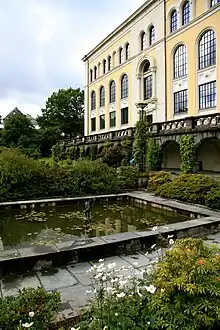
According to a reputation survey conducted in 2018, the Holberg Prize is the most prestigious interdisciplinary award in the social sciences (jointly with the Stein Rokkan Prize for Comparative Social Science Research).[1]
History
The prize was established by the Parliament of Norway in honor of Ludvig Holberg in 2003 and complements its sister prize in mathematics, the Abel Prize. Ludvig Holberg, who excelled in all the disciplines covered by the award, played an important part in bringing the Enlightenment to the Nordic countries and is also well known as a playwright and author. The objective of the prize was to increase awareness of the value of academic scholarship in the arts, humanities, social sciences, law and theology.[2] It has been described as the "Nobel Prize" for the arts and humanities, social sciences, law and theology.
Selection criteria
The Holberg Prize is awarded annually to scholars who have made "outstanding contributions to research in the arts and humanities, social sciences, law or theology."[3] Scholars holding positions at universities and other research institutions, including academies, are eligible to nominate candidates to the Holberg Prize and the Nils Klim Prize. Self-nominations are not permitted. The Holberg Board awards the prize at the recommendation of the Holberg Committee.The Holberg Committee meets twice. At the first meeting, in early fall, they choose a shortlist from the nominations. The Committee then gather assessments on the short-list candidates from internationally recognized scholars before giving their final recommendation to the Board.[4]
Organization
The Holberg Prize is funded through a direct allocation from the Norwegian government's budget. It is administered by the University of Bergen on behalf of the Ministry of Education and Research. The University of Bergen appoints the executive board of the Holberg Prize. The Holberg Board consists of the board chair and five board members. The board members must work in different institutions, and at least one board member must work outside the university and university college sector. Board members are appointed for a period of four years and may be reappointed once. The current Holberg Board is composed of: Kjersti Fløttum (Chair, University of Bergen), Knut Olav Åmås (Fritt Ord), Lise Rye (Norwegian University of Science and Technology), Hans Petter Graver (University of Oslo), Siv Ellen Kraft (University of Tromsø) and Torkild Hovde Lyngstad (University of Oslo).
The Holberg Board awards the prize at the recommendation of the Holberg Committee who consists of five outstanding researchers in the arts and humanities, social sciences, law and theology. The current Holberg Prize Academic Committee is composed of: Graeme Turner (Committee chairman, The University of Queensland), Mary Beard (University of Cambridge), David Nirenberg (University of Chicago), Heike Krieger (Free University of Berlin), Maurice Crul (Vrije Universiteit Amsterdam) and Cui Zhiyuan (Tsinghua University.)
Previous members of the Holberg Committee are among others: Mary Jacobus (University of Cambridge), Helga Nowotny (ETH Zurich), Kwame Anthony Appiah (New York University), Toril Moi (Duke University), Stein Kuhnle (The Norwegian Academy og Science and Letters), Johan P. Olsen (University of Bergen), and Pratap Bhanu Mehta (Center for policy research).
Laureates
| Year | Image | Laureate(s) | Country | Language(s) | Citation | Field(s) |
|---|---|---|---|---|---|---|
| 2004 | 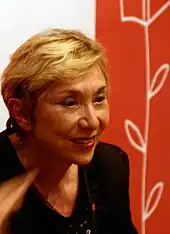 |
Julia Kristeva (b. 1941) |
Bulgarian, French, and English | "for innovative explorations of questions on the intersection of language, culture and literature which inspired research across the humanities and the social sciences throughout the world and have also had a significant impact on feminist theory"[5] | philosophy of language, semiotics, literary criticism, psychoanalysis, feminism | |
| 2005 | .jpg.webp) |
Jürgen Habermas (b. 1929) |
German and English | "for developing path-breaking theories of discourse and communicative action and thereby providing new perspectives on law and democracy"[6] | epistemology, social theory political theory, philosophy of law, Rationalization, pragmatics, pragmatism | |
| 2006 | 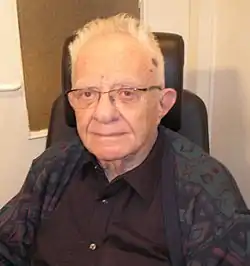 |
Shmuel Eisenstadt (1923–2010) |
Polish, English, and Hebrew | "for developing comparative knowledge of exceptional quality and originality concerning social change and modernization, and concerning relations between culture, belief systems and political institutions"[7] | social anthropology, social history, political science | |
| 2007 | 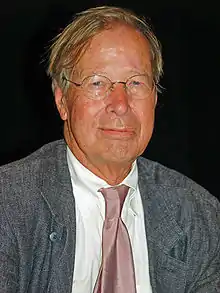 |
Ronald Dworkin (1931–2013) |
English | "for developing an original and highly influential legal theory grounding law in morality, characterized by a unique ability to tie together abstract philosophical ideas and arguments with concrete everyday concerns in law, morals, and politics"[8] | social justice, legal theory, political philosophy | |
| 2008 | .jpg.webp) |
Fredric Jameson (b. 1934) |
English | "for outstanding contributions to the understanding of the relation between social formations and cultural forms in a project he himself describes as the 'poetics of social forms'"[9] | postmodernism, hermeneutics, cultural studies, dialectical method, history | |
| 2009 | .jpg.webp) |
Ian Hacking (1936-2023) |
English | "for his combination of rigorous philosophical and historical analysis which has profoundly altered our understanding of the ways in which key concepts emerge through scientific practices and in specific social and institutional contexts"[10] | philosophy of science, philosophy of statistics | |
| 2010 | .jpg.webp) |
Natalie Zemon Davis (b. 1928) |
English and French | for "connecting early modern Europe with new areas of comparative history, exploring cultural, geographical and religious interchange"[11] | social history, cultural history, social anthropology, ethnography, literary theory | |
| 2011 | 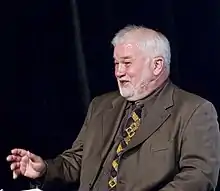 |
Jürgen Kocka (b. 1941) |
German and English | "for effecting a paradigm shift in German historiography by opening it up to related social sciences and establishing the importance of cross-national comparative approaches" | social history, hermeneutics, historiography | |
| 2012 | 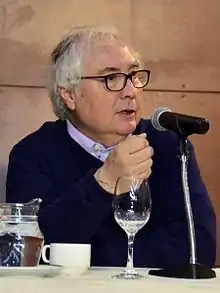 |
Manuel Castells Oliván (b. 1942) |
Spanish, French, and English | for shaping "our understanding of the political dynamics of urban and global economies in the network society"[12] | communication studies, organization studies, network society, urban sociology, sociology of culture, political economy | |
| 2013 | .jpg.webp) |
Bruno Latour (1947–2022) |
French and English | for having "undertaken an ambitious analysis and reinterpretation of modernity, and [having] challenged fundamental concepts such as the distinction between modern and pre-modern, nature and society, human and non-human"[13] | postmodernism, social constructionism, actor–network theory, metaphysics, social anthropology | |
| 2014 | .jpg.webp) |
Michael Cook (b. 1940) |
English | for having "reshaped fields that span Ottoman studies, the genesis of early Islamic polity, the history of the Wahhabiyya movement, and Islamic law, ethics, and theology"[14] | oriental studies, history of religion | |
| 2015 | .JPG.webp) |
Marina Warner (b. 1946) |
English | for her "analysis of stories and myths and how they reflect their time and place."[15] | mythography, feminism, oral tradition | |
| 2016 | 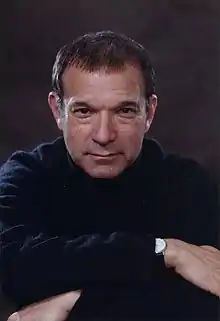 |
Stephen Greenblatt (b. 1943) |
English | for being "one of the most important Shakespeare scholars of his generation"[16] | new historicism, Renaissance studies, New Criticism | |
| 2017 | 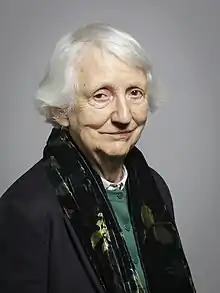 |
Onora O'Neill (b. 1941) |
English | for "her influential role in ethical and political philosophy"[17] | political philosophy, ethics | |
| 2018 | .jpg.webp) |
Cass Sunstein (b. 1954) |
English | for having "reshaped our understanding of the relationship between the modern regulatory state and constitutional law."[18] | legal theory, constitutional law, environmental law, administrative law, behavioral economics, social theory | |
| 2019 |  |
Paul Gilroy (b. 1956) |
English | "for his contributions to critical race studies, post-colonialism and related fields"[19] | cultural politics, cultural history, social anthropology | |
| 2020 | 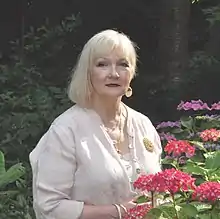 |
Griselda Pollock (b. 1949) |
English | "for her groundbreaking contributions to feminist art history and cultural studies."[20] | feminist theory, feminism, art history, gender studies | |
| 2021 |  |
Martha Nussbaum (b. 1947) |
English | "for her groundbreaking contribution to research in philosophy, law and related fields."[21] | liberal theory, political philosophy, feminism, ethics, social liberalism | |
| 2022 | 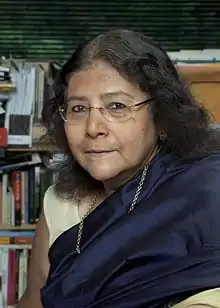 |
Sheila Jasanoff (b. 1944) |
English | "for her groundbreaking research in science and technology studies"[22] | science and technology studies, political sociology, public reason, capacity building | |
| 2023 |  |
Joan Martinez Alier (b. 1939) | Catalan, Spanish, and English | "for his research in ecological economics, political ecology and environmental justice."[23] |
The Holberg Week
During The Holberg Week in June, The Holberg Prize hosts a series of lectures, discussions and other events in honor of the Holberg Laureate and the Nils Klim Laureate. The events feature the laureates, as well as other high-profile international scholars. The program feature, among other things, the Holberg Symposium, the Nils Klim Seminar and the Holberg Lecture. All events during the Holberg week, with the exception of the award ceremony and government banquet, are open to all and have free entrance. Several of the events are also livestreamed, and available to an international audience.
The Holberg Debate
The Holberg Debate is an annual event organised by the Holberg Prize. The debate is inspired by Ludvig Holberg's Enlightenment ideas and aims to explore pressing issues of our time. The Holberg Debate was organised for the first time in 2016 and has since been held annually, on the first Saturday in December. The aim is both to see important voices debate pressing issues of our time and to highlight the relevance of the academic fields covered by the Holberg Prize: the humanities, social sciences, law and theology. Thus, the Holberg Debate seeks to engage both the university community and the public at large, and seeks to invite well known thinkers with a diverse background, including academics, journalists, authors, film makers and activists.
Former participants in the Holberg Debate are Slavoj Žižek, Timothy Garton Ash, Jostein Gripsrud, Jonathan Heawood, John Pilger and Julian Assange.
Other prizes
As part of its research dissemination targeting younger people, the Holberg Prize also awards two other prizes:
- The Nils Klim Prize is awarded annually to a younger Nordic researcher who has made an outstanding contribution to research in the arts and humanities, social science, law or theology.[24]
- The Holberg Prize School Project is a research competition for students in the upper secondary schools in Norway.[25]
Symposiums
The Holberg Symposium is held annually in honor of the winner of The Holberg Prize. The event hosts prominent speakers who partake in a symposium dedicated to The Holberg Prize laureate.
- Symposium in Honor of Julia Kristeva, 2004 – "Thinking About Liberty in Dark Times"[26]
- Participants: Kelly Oliver, Sara Beardsworth, John Fletcher, Atle Kittang and Iréne Matthis.
- Symposium in Honor of Jürgen Habermas, 2005 – "Religion in the Public Sphere"[27]
- Participants: Arne Johan Vetlesen, Gunnar Skirbekk, Cristina Lafont, Cathrine Holst, Helge Høibraaten, Craig Calhoun, Thomas M. Schmidt, Jon Hellesnes, Hauke Brunkhorst and Tore Lindholm.
- Symposium in Honor of Shmuel Eisenstadt, 2006 – "The Processes that Change the World"[28]
- Participants: Jack A. Goldstone, Jonathan Friedman, Sverre Bagge, Johann P. Arnason, Donald Levine, Bernhard Giesen, Shalini Randeria, Jeffrey Alexander, Fredrik Barth, Rajeev Bhargava, Said Amir Arjomand, Shalini Randeria, Luis Roniger, Nina Witoszek-FitzPatrick, Yehuda Elkana, Georg Klein, Bernt Hagtvet and Jeffrey Alexander.
- Symposium in Honor of Ronald Dworkin, 2007[29]
- Participants: Jan Fridthjof Bernt, Stephen Guest, Frank Henry Sommer, Jeremy Bentham's severed head, Jeremy Waldron, Peter Koller, Rebecca Brown, Seana Shiffrin, Thomas Nagel, Rainer Forst, Dietmar von der Pfordten and Synne Sæther Mæhle.
- Symposium in Honor of Fredric Jameson, 2008[30]
- Participants: William A. Lane, Jr, Astrid Söderbergh Widding, Paik Nak-chung, Maria Elisa Cevasco, Wang Hui, Michael Löwy, Perry Anderson, Sara Danius, Helmut F. Stern and Xiaobing Tang.
- Symposium in Honor of Ian Hacking, 2009[31]
- Participants: Ragnar Fjelland, Professor Dagfinn Føllesdal, Bruna De Marchi and Merle Jacob.
- Symposium in Honor of Natalie Zemon Davies, 2010 – "Doing decentered history – the global in the local"[32]
- Participants: Bonnie G. Smith, David Abulafia, Joan W. Scott, Ida Blom and Erling Sverdrup Sandmo.
- Symposium in Honor of Jürgen Kocka, 2011 – "Civil Society and the Welfare State: Competitors or allies?"[33]
- Participants: Theda Skocpol, Christoph Conrad, Per Selle, Simone Lässig, Stein Kuhnle and Ivar Bleiklie.
- Symposium in Honor of Manuel Castells, 2012 – "Media and Democracy"[34]
- Participants: Ivar Bleiklie, Helga Nowotny, Göran Therborn, Helen Margetts, Andrew Chadwick, Jostein Gripsrud, Terhi Rantanen, Annabelle Sreberny, William Dutton and Mette Andersson.
- Symposium in Honor of Bruno Latour, 2013 – "From Economics to Ecology".[35]
- Participants: Barbara Czarniawska, Dominique Pestre, Mike Hulme, Bronislaw Szerszynski, Oliver Morton, Adam Lowe,
- Symposium in Honor of Michael Cook, 2014 – "Ancient Religions, Modern Dissent".[36]
- Participants: Guy Stroumsa, Sabine Schmidtke, Maribel Fierro, Petra Sijpesteijn, Muhammad Qasim Zaman, and Mona Siddiqui.
- Symposium in Honor of Marina Warner, 2015 – "Myth, Homelessness, and the "Country of Words”".[37]
- Participants: Wendy Doniger, Roy Foster, Finbarr Barry Flood, Wen-chin Ouyang, and Tamim al-Barghouti.
- Symposium in Honor of Stephen Greenblatt, 2016 – "Art in life/Life in art".[38]
- Participants: Horst Bredekamp, Joseph Koerner, Pippa Skotnes, Homi Bhabha, Adam Phillips, Sarah Cole, Louis Menand, and Daniel Jütte.
- Symposium in Honor of Onora O'Neill, 2017 – "Ethics for Communication".[39]
- Participants: Jonathan Heawood, Rowan Cruft, Laura Valentini, Steven Barnett, and Rae Langton.
- Symposium in Honor of Cass Sunstein, 2018 – "Democracy and Truth".[40]
- Participants: Tali Sharot, Tyler Cowen, Samantha Power, Lawrence Lessig
- Symposium in Honor of Paul Gilroy, 2019 – "From Double Consciousness to Planetary Humanism".[41]
- Participants: Temi Odumosu, Sivamohan Valluvan, Lidia Curti, and Katherine McKittrick.
- Symposium in Honor of Griselda Pollock, 2020, will take place 2021.
See also
References
- Jiang, Fan; Liu, Niancai (2018). "The hierarchical status of international academic awards in social sciences". Scientometrics. 117 (3): 2091–2115. doi:10.1007/s11192-018-2928-y. S2CID 255010896.
- Longva, Hjørdis Maria (18 February 2010). "About the Holberg Prize". Holbergprisen. Retrieved 30 October 2018.
- Longva, Hjørdis Maria (18 February 2010). "About the Holberg Prize". Holbergprisen. Archived from the original on 16 June 2019. Retrieved 29 October 2018.
- Longva, Hjørdis Maria (18 February 2010). "About the Holberg Prize". Holbergprisen. Archived from the original on 16 June 2019. Retrieved 29 October 2018.
- "Julia Kristeva". Holbergprisen. Archived from the original on 25 October 2018. Retrieved 25 October 2018.
- "Jürgen Habermas". Holbergprisen. Archived from the original on 25 October 2018. Retrieved 25 October 2018.
- "Shmuel N. Eisenstadt". Holbergprisen. Archived from the original on 25 October 2018. Retrieved 25 October 2018.
- "Ronald Dworkin". Holbergprisen. Archived from the original on 20 August 2018. Retrieved 25 October 2018.
- "Fredric R. Jameson". Holbergprisen. Archived from the original on 25 October 2018. Retrieved 25 October 2018.
- "Ian Hacking". Holbergprisen. Archived from the original on 25 October 2018. Retrieved 25 October 2018.
- "Natalie Zemon Davis". Holbergprisen. Archived from the original on 18 June 2018. Retrieved 25 October 2018.
- "Manuel Castells". Holbergprisen. Archived from the original on 25 October 2018. Retrieved 25 October 2018.
- Bruno Latour wins the 2013 Holberg Prize Archived 29 March 2019 at the Wayback Machine, Holberg Prize
- "Michael Cook | Statement from the Holberg Committee". Holbergprisen.no. Archived from the original on 30 October 2014. Retrieved 17 July 2017.
- "Marina Warner | Statement from the Holberg Committee". Holbergprisen.no. 10 June 2015. Archived from the original on 1 August 2017. Retrieved 17 July 2017.
- "Stephen Greenblatt | Statement from the Holberg Committee". Holbergprisen.no. 8 June 2016. Archived from the original on 1 August 2017. Retrieved 17 July 2017.
- Publisert 10 March 2017. "Onora O'Neill | Statement from the Holberg Committee". Holberg.uib.no. Archived from the original on 1 August 2017. Retrieved 17 July 2017.
- Publisert 10 March 2017 (13 March 2018). "2018 Holberg Prize". Holberg.uib.no. Archived from the original on 1 August 2017. Retrieved 14 March 2017.
- Sandmo, Ole (13 March 2019). "2019 Holberg Prize and Nils Klim Prize Laureates". Holbergprisen. Archived from the original on 21 May 2021. Retrieved 14 March 2019.
- "2020 Holberg Prize and Nils Klim Prize Laureates Announced". holbergprisen. 5 March 2020. Retrieved 5 March 2020.
- "Martha C. Nussbaum | Holbergprisen". holbergprisen.no (in Norwegian Bokmål). Retrieved 5 March 2021.
- "Science and Technology Studies Pioneer Sheila Jasanoff Named 2022 Holberg Laureate". holbergprisen.no. University of Bergen (Norway). Retrieved 14 March 2022.
- "Environmental Justice Scholar Joan Martinez-Alier Named 2023 Holberg Laureate". Holbergprisen. Retrieved 14 March 2023.
- Longva, Hjørdis Maria (5 March 2015). "Nils Klim Prize". Holbergprisen. Archived from the original on 16 June 2019. Retrieved 5 November 2018.
- The Holberg Prize – School projects
- "Holbergprisens symposium 2004: Julia Kristeva | Holbergprisen" (in Norwegian Bokmål). Holbergprisen.no. Archived from the original on 1 August 2017. Retrieved 17 July 2017.
- "Holbergprisens symposium 2005: Jürgen Habermas "Religion in the Public Sphere" | Holbergprisen" (in Norwegian Bokmål). Holbergprisen.no. Retrieved 17 July 2017.
- "Holbergprisens symposium 2006: Shmuel N. Eisenstadt | Holbergprisen" (in Norwegian Bokmål). Holbergprisen.no. Retrieved 17 July 2017.
- "Holbergprisens symposium 2007: Ronald Dworkin | Holbergprisen" (in Norwegian Bokmål). Holbergprisen.no. Retrieved 17 July 2017.
- "Holbergprisens symposium 2008: Fredric R. Jameson | Holbergprisen" (in Norwegian Bokmål). Holbergprisen.no. Retrieved 17 July 2017.
- "Holbergprisens symposium 2009 | Holbergprisen" (in Norwegian Bokmål). Holbergprisen.no. Retrieved 17 July 2017.
- "Holbergprisens symposium 2010: Doing decentered history – the global in the local | Holbergprisen" (in Norwegian Bokmål). Holbergprisen.no. Retrieved 17 July 2017.
- "Holbergprisens symposium 2011: "Civil Society and the Welfare State: Competitors or allies?" | Holbergprisen" (in Norwegian Bokmål). Holbergprisen.no. Retrieved 17 July 2017.
- "Holbergprisens symposium 2012: Media and Democracy | Holbergprisen" (in Norwegian Bokmål). Holbergprisen.no. Retrieved 17 July 2017.
- Longva, Hjørdis Maria (25 September 2012). "The Holberg Symposium 2013: From Economics to Ecology". Holbergprisen. Retrieved 29 October 2018.
- Longva, Hjørdis Maria (16 December 2013). "The Holberg Symposium 2014: Ancient Religions, Modern Dissent". Holbergprisen. Retrieved 29 October 2018.
- Longva, Hjørdis Maria (14 April 2015). "The Holberg Symposium 2015: Myth, Homelessness, and the "Country of Words"". Holbergprisen. Retrieved 29 October 2018.
- Longva, Hjørdis Maria (14 March 2016). "The Holberg Symposium 2016: Art in Life / Life in Art". Holbergprisen. Retrieved 29 October 2018.
- Longva, Hjørdis Maria (28 April 2017). "The Holberg Symposium 2017: Ethics for Communication". Holbergprisen. Retrieved 29 October 2018.
- Sandmo, Ole (17 April 2018). "The Holberg Symposium, 2018: "Democracy and Truth"". Holbergprisen. Retrieved 29 October 2018.
- "The 2019 Holberg Symposium: "From Double Consciousness to Planetary Humanism" | Holbergprisen". holbergprisen.no (in Norwegian Bokmål). Retrieved 30 November 2020.
External links
- Official website

- Reactions, from the Norwegian researchers' association
- Debate, from forskning.no
- Jon Elster: Too much politeness, too little quality, about Norwegian academic life in general and the Holberg Prize in particular